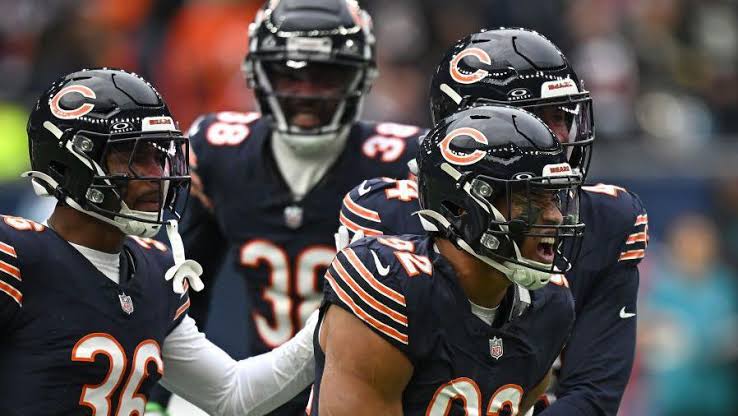
The Chicago Bears’ season has been a rollercoaster of ups and downs, and the latest incident involving star wide receiver D.J. Moore has only added fuel to the fire. In a highly debated moment during the Bears’ matchup against the Arizona Cardinals, Moore shocked fans and analysts alike when he was seen going to the bench mid-play At first, many wondered if there had been a miscommunication, an injury, or perhaps a temporary lapse in focus. However, Moore’s explanation post-game has sparked a storm of controversy, raising questions about the team’s dynamics, leadership, and the mental state of the franchise.
The Moment That Left Fans Stunned
The game was in a pivotal moment when, on a crucial third-down play in the second quarter, D.J. Moore was seen jogging off the field and heading toward the sideline — *mid-play*. Cameras zoomed in as Bears quarterback Justin Fields appeared to look toward Moore, only to realize he wasn’t there. The play ended without Moore in the route, and the Bears were forced to punt. As Moore’s absence on the field became evident, fans at Soldier Field gasped, while social media was set ablaze with questions.
Why would a player of Moore’s caliber — a player who had been one of the few bright spots for a struggling Bears offense this season — make such a puzzling decision in the middle of a live game? The moment was one of disbelief, and many fans were left wondering if it was a mistake or a sign of deeper issues within the team.
D.J. Moore’s Explanation
After the game, Moore took to the podium and offered an explanation for his actions, which only served to stir up more confusion. He told reporters that he needed a breather due to feeling mentally overwhelmed” in the midst of the game. While Moore didn’t elaborate much on the specifics of his mental state, he made it clear that his decision to go to the bench wasn’t a physical injury or an issue with the play call.
I just had a moment where I felt like I needed to reset, Moore explained. It wasn’t about the play or anything physical. I just felt like I needed to take a second to collect myself mentally. This game is a lot sometimes, and I just needed a quick breather to get back to my focus.
While mental health awareness in sports has become an increasingly important conversation, Moore’s response left many questioning if this was truly a moment of vulnerability or just an excuse for a lack of professionalism. The fact that Moore left his quarterback in the lurch during a critical play did not sit well with some fans, especially given that this wasn’t just any game—it was a contest between two teams desperately trying to stay relevant in the NFL playoff picture.
A Bigger Issue or A One-Time Mistake?
Some analysts argue that Moore’s decision to step off the field mid-play may not be an isolated incident but rather a symptom of a larger issue within the Bears’ organization. Chicago’s offense has been criticized for lackluster performances all season, and a situation like this only adds to the belief that there may be internal problems that need addressing. For a team already struggling with a lack of identity and discipline, Moore’s explanation could be seen as a red flag.
Could the Bears’ struggles be a result of a lack of mental toughness? After all, it’s not common for an elite player to walk away from a critical moment mid-game, and some believe Moore’s actions might be a sign of internal unrest or a fractured relationship between players and coaching staff.
On the other hand, it could just be an isolated incident, a rare lapse in judgment from an otherwise professional player. Many have pointed out that Moore has been a model of consistency for the Bears since being acquired in a trade with the Carolina Panthers, and one mistake shouldn’t necessarily define his entire career. But the fact that it happened in such a high-stakes moment raises important questions.
Fans and Coaches React
Reactions from the Bears’ fanbase have been mixed. Some understand Moore’s need to take care of his mental health, citing the growing importance of player well-being in professional sports. Others, however, are less forgiving. “You’re paid to play, not take mental health breaks in the middle of the game, one frustrated fan wrote on social media. What happens when the playoffs are on the line? Is he going to take a breather then too?
Head coach Matt Eberflus, who has often preached accountability and discipline, was asked about the incident during his post-game press conference. While he didn’t seem overly concerned, he did express a desire for all players to remain focused and committed to the team’s goals. “D.J. is a valuable part of our team, and we all need to be accountable on every play,” Eberflus said. “We’ll address this situation as a team and make sure we move forward in a positive way.”
Conclusion: More Than Just a Breather?
The D.J. Moore incident against the Arizona Cardinals could be a momentary lapse, or it could signify deeper issues within the Bears’ locker room. Mental health in sports is a topic that’s been gaining traction, but leaving the field mid-play raises questions about professionalism and focus. Whether Moore’s explanation is valid or simply an excuse remains to be seen, but one thing is clear: The Bears have a lot of questions to answer, both on and off the field.
As the Bears attempt to salvage their season, this controversial moment will linger in the minds of fans and analysts alike. Is this an isolated incident, or a sign of cracks in the foundation of a franchise desperate for a turnaround? Only time will tell, but for now, D.J. Moore’s decision has left the NFL world with more questions than answers.




